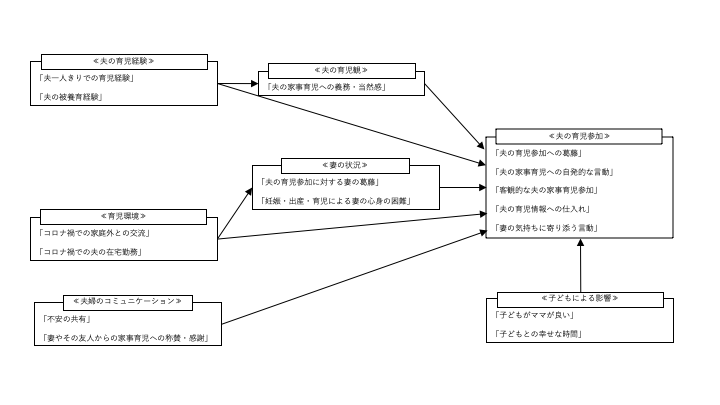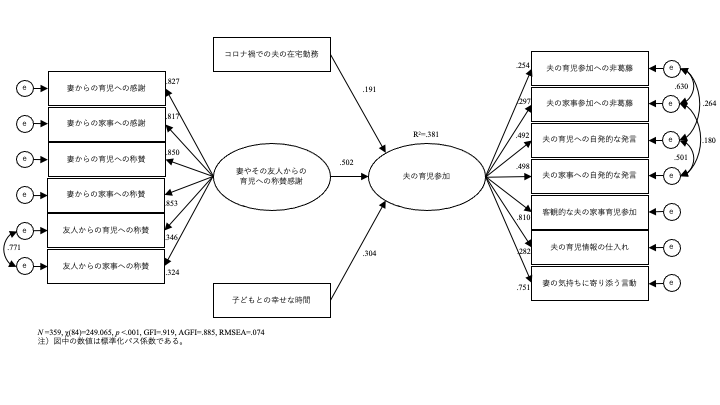- The following is content from the press release -
A research group led by Manami Kodama (Watanabe) and Shosuke Asano of Idealabo Inc. and Fumi Suga and Yosuke Narito of the Symbiotic Society Research Institute of Unicharm Corporation has identified factors that encourage male participation in childcare based on interviews with married couples and a questionnaire survey of husbands.
This study showed that husbands "working at home," "feeling happy to see their children smile and grow," and "feeling that they receive positive recognition for their childcare and household chores" promote fathers' participation in childcare.
The Corona Disaster revealed the possible impact of the corporate work system on families raising children, and provided new insights into "male participation in childcare," which is attracting attention in society.
The results of this research were published in the Journal of the Japanese Society of Home Economics, Vol. 73, No. 6.

Key Research Findings
- Factors that promote/inhibit husbands' housework in the Corona Disaster were identified.
- Main Facilitating Factors:Work from home, happy time with children, praise and appreciation from wife and friends for childcare and houseworkhave
- The need for companies and society to encourage women to allow their husbands to work from home whenever possible, and to give husbands the opportunity to see their children smile and grow as much as possible was indicated.
Research Background
The Cabinet Office has identified "promotion of men's participation in housework and childcare" as a priority issue in its measures to cope with the declining birthrate (Cabinet Office, 2022), and measures such as correcting long working hours, promoting telework, and establishing a new male childcare leave system from October 2022 have begun. While men's participation in childcare is considered an important issue for society, the reality is that married women spend 4 hours and 55 minutes per day on housework, while married men spend 49 minutes, a significant gap that remains (Ministry of Internal Affairs and Communications, 2019).
We believe that in August 2020, when the study data were obtained, there were restrictions on interaction with non-family members due to the spread of the new coronavirus, and childcare support from outside the home was scarce, making the husband's participation in childcare more important for the wife and children. It is also possible that the spread of telecommuting has increased the amount of time spent at home, leading to a situation in which the husband participates in childcare regardless of his prior intentions regarding childcare participation. This study was conducted to identify factors that promote/inhibit childcare participation by fathers raising their first child under such circumstances.
Research
Study 1 generated a hypothetical model of husbands' participation in child rearing based on semi-structured interviews with 10 couples, and Study 2 tested the model generated in Study 1 by conducting a questionnaire survey of 360 husbands. In summary, the research was summarized as follows. As a summary of the research, a model was generated that summarized the factors that promote/inhibit husbands' participation in child rearing.


The results of the study indicated that the following three factors encourage husbands to participate in childcare: (1) husbands work from home, (2) husbands feel happy when they see their children smile and grow, and (3) wives and friends praise and appreciate their husbands' childcare.
Social Impact
Fathers' participation in child-rearing is considered to have important significance not only for wives who raise children together but also for children and husbands themselves (Kirino et al., 2011; Kato et al., 2002; Morishita, 2006). In addition, it has been known that encouragement from children to fathers influences their participation in child rearing (Morishita, 2006), but we newly found that another important factor is whether fathers positively evaluate their children's smiles and growth.
According to a survey by the Ministry of Internal Affairs and Communications, of the 1209 companies that introduced telecommuting due to the coronary disaster, approximately 80% indicated that they plan to utilize or are considering telecommuting even after convergence (MIC, 2021). Even if infectious disease control measures are no longer necessary in the future, the results of this study indicate that a flexible work system may support child rearing.
In order for companies and society to encourage men to participate in childcare, we believe it is necessary to encourage them to allow them to work from home whenever possible and to provide them with opportunities to see their children smile and grow as much as possible.
Comments from Researchers
The study revealed the following three points. First, it was shown that being at work even under the corona disaster situation is a major barrier to fathers' participation in childcare. Many companies have established telecommuting systems under the corona disaster situation. It is hoped that a society will continue to allow telecommuting as much as possible in the future. Second, the results showed that seeing the smiling faces of children and their growth motivates fathers to participate in childcare. Even when fathers are at work, it may be necessary for them to provide their children with opportunities to see their smiling faces and their children's growth on a daily basis through smartphones and other devices. Third, praise and appreciation from wives and friends to their husbands also encouraged fathers to participate in child-rearing (this was not the subject of this study). (Although it was not included in this study, it is of course important to give praise and appreciation to mothers who are raising children on a daily basis.
It is undeniable that the coronary disaster situation will continue and that new changes in social conditions will occur in the future. Under such circumstances, we believe that one of the great significance of this study will be if couples can use the findings of this study as a reference to move forward with child rearing.
Manami Kodama (Watanabe)
Researcher, Idealabo Inc.
Doctor of Education
Original Paper Information
Kodama(Watanabe), Manami, Asano, Shosuke, Suga, Fumimi, Narito, Yosuke(2022). An examination of inhibiting/promoting factors of fathers' participation in child care for their first child under the special circumstances of the coronary disaster: Focusing on the increase in telecommuting and lack of support from outside the family Journal of the Japan Society of Home Economics, 73(6), 306-320.
The paper is available for open access at the following link
https://www.jstage.jst.go.jp/article/jhej/73/6/73_306/_article/-char/ja/















The Corona Disaster has revealed the possible impact of a company's work system on families raising children, and the results of the study provide new insights into "men's participation in childcare," a topic that is attracting much attention in society.
The results show that husbands "working from home," "feeling happy to see their children smile and grow," and "feeling that they receive positive recognition for their childcare and household chores" promote fathers' participation in childcare.
Let's take a look at the details from the press release.